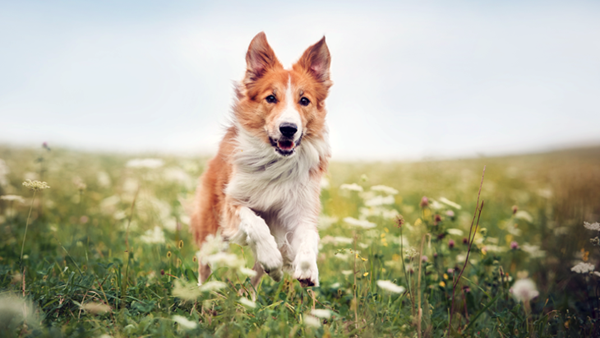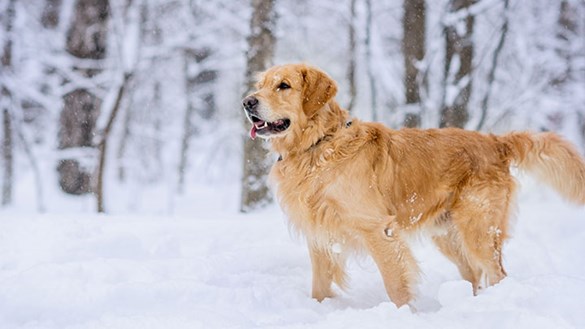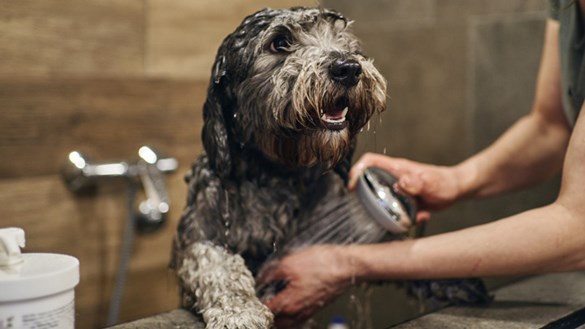Cold Weather Care For Dogs
Winter care for dogs can be a challenge. From cold weather sniffles to signs of an underlying issue, make sure you’re aware of how the winter months can affect your dog.

Can dogs catch a cold?
The common cold is a fact of life for humans, but you may wonder if your own sneezing and coughing puts your dog at risk. Thankfully, the answer is no, as the cold virus we experience is species-specific, meaning it can only be passed between humans.
However, when the temperatures drop and it becomes too cold for most dogs (around 7 degrees Celsius), that’s when dogs are more vulnerable to their own version of a cold, with similar symptoms. When it's cold outside, many dogs (and their owners) love nothing better than snuggling up and staying warm indoors. However, less exercise can lead to weight gain, especially when seasonal celebrations bring lots of delicious food to nibble on.
Symptoms of colds in dogs
- Sneezing
- Runny or stuffy nose
- Watery eyes
This mild respiratory infection can be uncomfortable for dogs, but usually isn’t severe. If they’re kept warm and hydrated, they should recover within a week.
It’s important to bear in mind that these symptoms can also indicate a more serious issue. Canine parainfluenza virus, distemper, and canine bronchitis also produce similar symptoms and pose a risk to your dog’s overall health. If your dog has a forceful, hacking cough, this can be an indicator of kennel cough which can create issues for puppies and dogs with existing medical conditions. Some of these potentially serious issues can be vaccinated against, so keep your dog protected with regular boosters.
Hypothermia in dogs
Hypothermia occurs when your dog’s body heat drops to extremely low levels, usually after being exposed to very cold temperatures or as a result of having wet fur in cold, windy weather.
Symptoms of hypothermia in dogs
- Shivering (although this will suddenly stop when their temperature reaches dangerously low levels)
- Pale lips and gums
- Low energy
- A loss of coordination
Hypothermia is an emergency, so if you spot any of these symptoms, contact your vet immediately.
To prevent hypothermia in a cold snap, make sure your pet has somewhere warm and dry to go and try and keep them dry on winter walks – remember, lakes and rivers can reach freezing temperatures that can shock their system. Dogs with short, thin fur may also benefit from a dog coat to keep them warm.
Frostbite in dogs
Frostbite can also occur in very low temperatures which can freeze their extremities (the tips of their ears, tail and toes). Although not usually life-threatening, it can lead to hypothermia which can be fatal.
Symptoms of frostbite in dogs
Symptoms include the skin becoming very pale with a blue-white hue, due to the lack of blood flow, and ice can even form around the area. To prevent it from progressing and putting the local tissue at risk, apply a warm towel to the affected area. Never use a hairdryer or radiator to directly warm them up; this can cause burns and blistering. Instead, use tepid water to warm the area gradually and speak to your vet to check no additional treatment is required.
Antifreeze poisoning in dogs
Containing the toxin ethylene glycol, antifreeze can have a devastating effect on dogs when swallowed. Leaky car radiators can leave puddles of sweet-tasting antifreeze on driveways and just one tablespoon can cause acute kidney failure in dogs. Don’t forget that public fountains and water features can also contain antifreeze to stop them from freezing over.

Symptoms of antifreeze poisoning in dogs
Sadly, antifreeze poisoning is often fatal, but the quicker your dog receives veterinary treatment, the better their chances of survival. The first symptoms of antifreeze poisoning in dogs include:
- Staggering and unsteadiness
- Excessive thirst
- Vomiting and diarrhoea
- Loss of appetite
- Seizures
Eventually these could lead to kidney failure. If you spot any of these signs in your dog, take them to your vet immediately.
Try to avoid using antifreeze. Keep containers securely closed and always clean up leaks and spills as soon as possible.
Arthritis in dogs
Arthritis and joint pain worsen in cold weather, so if your dog has the condition, bear in mind that they may be in more discomfort during the winter months.

There are ways you can help soothe their pain and stiffness, which usually occurs in older dogs in their shoulders, hips, ankles, knees and spine. Keep them warm both inside and out with a cosy dog coat and extra blankets, and make sure they have a comfortable place to rest that supports their joints. Keep your dog moving with plenty of exercise and maintain a healthy weight to reduce pressure on their joints. Read more advice on Arthritis in dogs.
Keeping your dog active in winter
Rather than long walks, try and aim for shorter, more frequent trips to keep them moving without getting too cold. If you have space, get creative with indoor playtime to keep them active. You may also need to adjust the amount you feed your dog, as they won't need as many calories if they’re less active. Speak to your vet for advice on adjusting your dog’s diet for the winter season.
Dry skin on dogs
Turning up the central heating during cold weather can wreak havoc on your dog’s skin. The dry air can leave it dehydrated and lacking essential oils, causing flaky, sensitive skin which can be very uncomfortable.
Brush their coat daily to remove flakes and stimulate the natural oils that keep their skin and coat healthy. Bathing can further dry out their skin, so try cutting back on this over the winter months. When you do have to give them a bath, opt for a moisturising dog shampoo. You may also want to invest in a humidifier to add moisture back into the air and don’t forget to provide plenty of fresh, clean water for them to drink.
Puddles
The one certainty during the British winter is rain. Whilst dogs often love splashing around in puddles, they could pose a hidden risk to their health.

Leptospirosis can be picked up by drinking from puddles that contain urine from an infected wild animal (including deer, rats and farm animals). This bacterial disease can be extremely dangerous to your dog’s health, causing vomiting, diarrhoea and kidney failure. Thankfully, it can be successfully vaccinated against – make sure your dog has had their annual booster vaccination to protect them from this fatal disease.
Find your local practice

Medivet Healthcare Plan
On average our clients save up to £280 each year with the Medivet Healthcare Plan.
Learn more

Our Pet Care Advice
At Medivet, we’re committed to providing trustworthy, expert advice that helps you care for your pet. Don't miss our latest advice for keeping your pets happy and healthy.
Search advice




